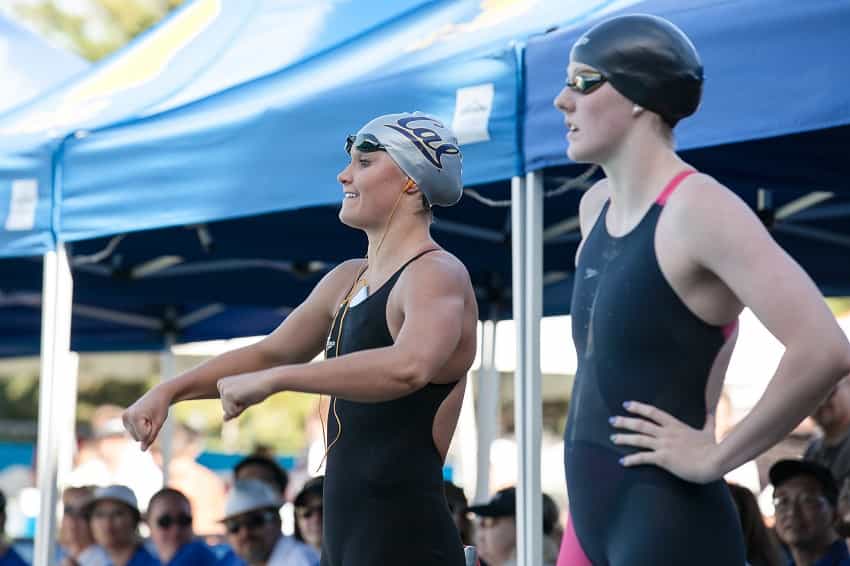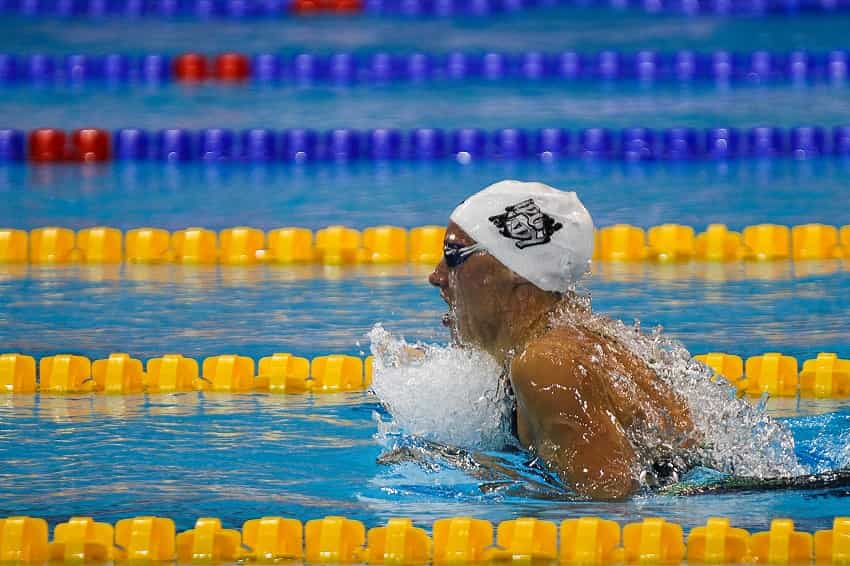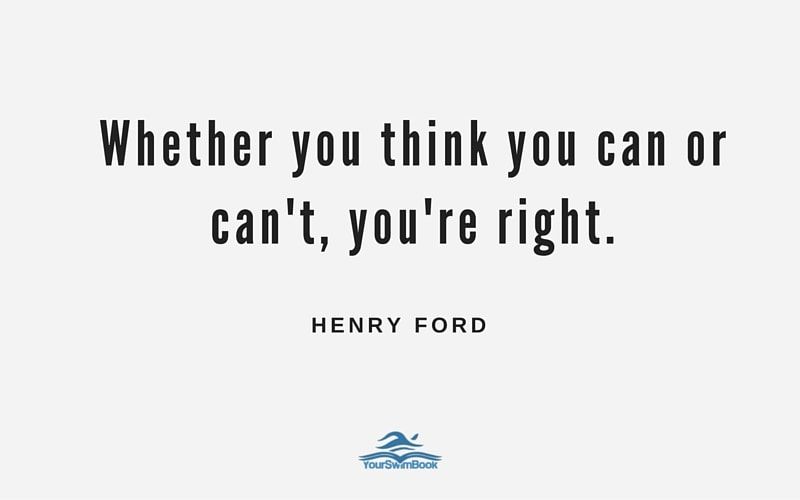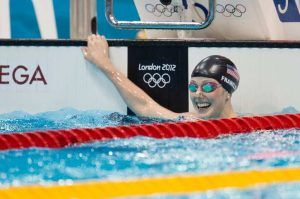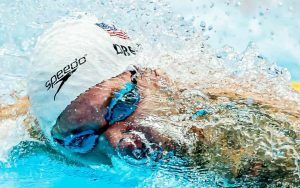At some point we have all stood on the brink of a tough workout or big-time race and found ourselves thinking, “I can’t.” Here is what you need to know about these two little words that are keeping you from swimming to your potential.
- I can’t do this set, it’s too hard.
- I can’t make that interval; I’ve never done it before.
- I can’t be more consistent in attendance; I have too much on my plate.
- I can’t stay focused on my technique for the whole workout.
- I can’t be successful, my coach told me so.
How many times have you caught yourself saying something like this at some point? How about recently? Or how about today?
Swimming is hard, it’s unfair, it’s a struggle, and it requires what can sometimes appear like a fantastically unequal amount of work for the results we crave.
But those two toxic little words…I can’t….only serve to make the sport and achieving our goals in the water that much harder.
What Happens When You Say “I Can’t”
As far as self-talk for swimmers goes, this one is a complete momentum-stopper. It guarantees that you are short-changing your effort and results in the pool.
After all…
I can’t robs you of control over the situation. Those two salty little words tell you the situation is impossible. That it is so hard or challenging that it is out of your control. Enter a feeling of helplessness from stage right. And what is worse than a feeling of hopelessness? Getting DQ’d? Being sick the day coach finally lets everyone plays Sharks and Minnows for the whole practice? Pretty much.
I can’t is a cover for choosing not to do something. When I hear an athlete say “I can’t” what I am really hearing is that “I won’t.” They’ve sized up the situation to be impossible (even though it usually isn’t), and by labeling it as such find comfort in thinking that the task would be pointless to try. So they don’t. It’s not that you can’t, it’s that you won’t.
I can’t is self-sabotage at its finest. There are cases where you can’t do something. I can’t be Bruce Wayne. Or grow another three inches. Or turn back the hands of time. But for the rest? Yup.
I can’t limits your ambition. People, and swimmers are no different, are pretty clueless when it comes to being self-aware. We think things will be easier or harder than they should be. Which you understand on some level—at some point you underestimated how much work it would take to get you to a goal, while also overestimating the agony and difficulty of that crazy set coach scrawled on the whiteboard during your recent training camp. The reality is that you don’t know what your limits are. And the only way to find out is to work your butt off.
I can’t is stressful. You might not ever have considered it, but negative thinking is stressful. And stress, well, it kind of blows.
How to Get Past Using “I Can’t”
If you could turn off, or at the very least better rationalize, those moments where you tell yourself that you can’t do something how much more productive would you be?
How much better would your workouts be?
How much faster would you perform over the long run if you were able to loosen the grip of those two seemingly harmless little words?
Here are a few ideas for getting over the “I can’t” barrier:
I can’t is your default setting.
Maybe this will make you feel better—feeling like you can’t do something tough or unpleasant is normal. Your brain sees pain and struggle ahead and thinks it’s protecting you and doing you a favor by scrambling to justify why you shouldn’t do it.
Remember: your brain loves order, it loves control, and it loves the little comfort zones you have created for yourself. Acknowledging that this initial resistance is natural is the first step to working with it to become a faster swimmer.
Just do it anyway.
I found that a big source of the “I can’t” anxiety for myself as an age group swimmer was the overwhelming pressure I placed on myself to perform. Because I set my expectations so high in practice, I ended up psyching myself out before big sets and swimming workouts.
Which in turn would lead to wasted training opportunities. Sometimes you really do just need to turn your brain off and train.
Commit to starting, and nothing else.
I have talked before about the overwhelming power of starting. It really is the end-game for achieving worthwhile things.
Once we get past the mental resistance of starting that hard set things seem to get easier—or at least, not so bad—in a hurry.
The power of starting is legit, and will quiet the squeaky voice of “But-but, I can’t!” and replace it with—“but I’m already doing it, so shut your mouth!”
Turn your self-doubt on its head.
No matter how experienced you become in the pool and with this infectious form of self-doubt it will always be there. (Sadly.) But how loud you let those thoughts become comes down to how you choose to approach them.
Here are a couple examples of mental judo you can use that acknowledges your fear while also deploying some optimism and forward movement:
But what if I did:
“I can’t do this set.” –> “This set looks pretty hard, but I bet I would feel pretty good if I completed it.”
Social proof:
“I can’t achieve my goals.” –> “My goals are difficult, but my teammate Harry was able to accomplish it so why can’t I?”
Bite-size the problem:
“I can’t do this whole set.” –> “I will do the first rep at full effort and take it from there.”
Been there, done that:
“I can’t stand it when this happens.” –> “I’ve been here before and managed to overcome it.”
The Takeaway
Choosing not to do something is not the same as not being able to do something. Each day in the chlorinated midst of your local aquatic center it is your duty to separate the two.
Look, those feelings of resistance and doubt will always be there. And that’s okay. But the thing is–and I know a lot of young swimmers (and adults, come to think of it) struggle to understand this– optimism and positive-thinking is largely a choice.
Start by pushing yourself out of your comfort zone, dial down the loud voices of doubt, and just start.
Up Next:
The Myth of Motivation. Somewhere along the way you were told that motivation was essential for working hard and achieving big things. Here is why motivation isn’t as important as you think.
How to Avoid Burnout in Competitive Swimmers. We’ve all experienced the lows in the sport, when we feel absolutely morose about the sport we once loved so dearly. Here is how to help avoid those scenarios.

